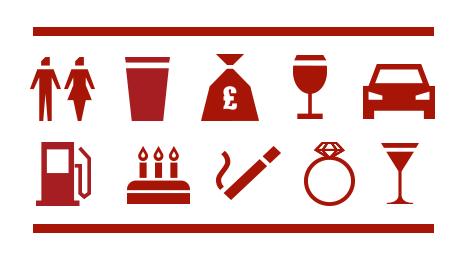Osborne's famine followed by feast
- Published
- comments

Here are the big numbers in the Budget that caught my eye.
The national debt will now reach a peak in the current year, a year earlier than we were told only in December, at 80.4% of GDP or national income.
And it will then fall gently the following year to 80.2% of GDP, and subsequently fast towards the end of the next parliament, to 71.6%.
So the national debt would be moving towards a more comfortable level. Though it is important to point out that at the end of the next parliament the debt would still be a little greater than this government thought it would be by now when it made its first Budget in 2010.
So if you think getting the debt down is the big priority, the last five years have seen a good deal of austerity for very delayed gain. It is taking precisely twice as long as George Osborne hoped to get the debt down to 70% of GDP.

Users of the BBC News app tap here, external for the Budget Calculator.
And to achieve that deferred gain, the Office for Budget Responsibility says the acuteness of austerity will get worse, before it gets a lot better.
Slice
So the OBR is projecting real or inflation-adjusted cuts in public services of more than 5% in 2016-17 and 2017-18, which is more than double the cuts we've seen in the worst years of this parliament.
But after that, and as I suggested might happen in recent columns, there would be a sharp 4% increase in spending in 2019-20.
Here is what is striking. Austerity on average is projected for the next parliament to be a little less severe than in the parliament that is drawing to a close. But there would be famine followed by feast, or what the OBR describes as a roller coaster.
There is an argument that decision making by ministers would be more rational if their budgets were less volatile.
And there is another argument which says those bigger planned cuts are unrealistically huge, especially since the Tories say they would be concentrated on services other than the protected areas of schools, health and overseas aid.
Asset sales
That said, the chancellor says that the OBR is being a bit harsh on him. Because he says in practice his public service cuts would be less, because he thinks he can slice a substantial £12bn from welfare spending.
If he achieves those savings, plus some additional revenue from cracking down on tax avoidance, then austerity in the next parliament would be similar to what we've been living through.
The problem is that George Osborne hasn't told us which welfare recipients would suffer.
Also some would argue that George Osborne's achievement of getting the debt down faster is a bit less impressive than it seems, because he is counting on raising substantial sums from asset sales - which will eventually run out.
Next year, for example, he intends to raise £20bn from sales of Lloyds shares and mortgages made by the nationalised banks Northern Rock and Bradford & Bingley.
Crisis round corner?
Even so, George Osborne has lamed - if not shot - one of Labour's foxes, namely that Tory spending cuts would be egregiously larger than Labour's.
A corollary of the OBR's projection that the surplus on the budget will be £7bn in 2019-20, rather than the £23bn projected in December, is that a Labour government's ability to spend more than a Tory one would be reined in a bit.
Because of the two parties' different Budget rules, and Labour's self-awarded freedom to borrow to invest, a Labour government could spend £38.8bn more per annum than a Tory one in five years. That means Labour could boost spending on public services by more than 10% compared with the Tories - a hefty increment.
So the choice confronting voters hasn't changed much as a result of this Budget: more spending on public services with Labour (and to a lesser extent with the Liberal Democrats); faster debt reduction with the Tories.
And your judgement about who is right depends on your assessment of how big you want the public sector to be, and how likely you think it is that there is another economic crisis around the corner - because the more imminent such a shock may be, the more haste is appropriate for debt reduction.